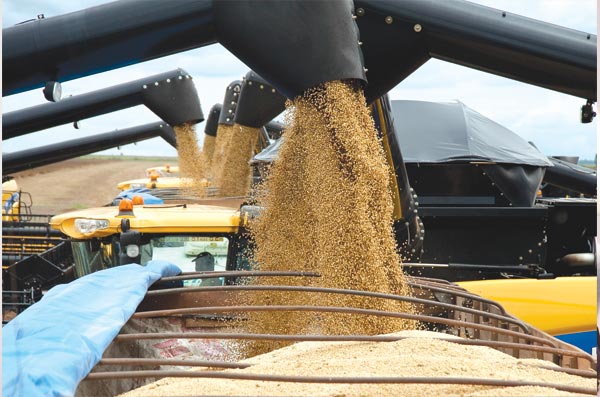 advances in the global trade of soybeans have been a source of uncertainty during recent trade talks in China, but the issue is unlikely to stem the rising Chinese interest in the alternative protein source, according to a group of agricultural officials.
advances in the global trade of soybeans have been a source of uncertainty during recent trade talks in China, but the issue is unlikely to stem the rising Chinese interest in the alternative protein source, according to a group of agricultural officials.Paul Burke, regional director of North Asia for the US Soybean Export Council (USSEC), said China is the largest global importer of soybeans and despite recent hang-ups the country remains "an important customer" for North and South American soybean farmers.
Soybeans are transferred into a grain carts at Delta Farm in Bahia, Brazil. Provided to China Daily
"Soybean farmers want very much to be viewed as a partner and part of China's overall solution to realizing its important goals of achieving sustainable food security and food safety," Burke said in an email to China Daily.
Bloomberg News reported on March 18 that Brazil is set to harvest a record soybean crop this year, according to CONAB, a division of Brazil's Ministry of Agriculture, Livestock and Food Supply. Soybean production in Brazil is expected to approach 80 million tons.
"The US soybean industry has been actively engaged in China for 32 years, and last year China purchased 37 percent of its imported soybean needs from the US," he said. "Most forecasts indicate that Brazil will be the world's largest producer and exporter of soybeans after their harvest is complete this year."
The US is the world's largest exporter of soybeans, according to data from the United States Department of Agriculture (USDA), and Brazil is a close second. Other significant global players in the soybean production market include Argentina and China.
The International Soy Growers Alliance (ISGA), a group that comprises soybean producers from the US, Brazil, Argentina, Paraguay and Uruguay, has been meeting with agricultural officials over the last few weeks in China to promote the infrastructure for continued import growth in the world's second largest economy.
Burke said the five countries taking part in the ISGA's first trip to China represent 90 percent of the world's soy production.
"ISGA has organized delegations to the European Union, but never to China," Burke said. "In order for global soybean producers to meet growth, they will need access to new technologies that allow them to increase yields without increasing inputs and costs. Some of these solutions will include introduction of new biotech soybean traits."
Soybean trade totals are expected to hit record highs in the 2013-2014 season. China's soybean consumption is expected to near 70 million tons, according to USDA and Oil World forecasts.
Oil World is an independent forecasting service providing online and printed information for the oilseed crop market.
Mark Ash, an economist with the USDA, said though China is one of the top trading partners for soybeans the approval process for biotech varieties of the crop has been a sticking point.
"A unified position of the major exporters of soybeans is needed to convey the idea that biotechnology is not only a common worldwide production practice but also a safe one," Ash said. "These obstacles, however, are neither permanent nor unsolvable."
Ash said he does not see a "breakthrough in China's stance" from a single round of discussions, but a continuing dialogue "can gradually inform and correct misunderstandings".
Grant Kimberley, director of marketing with the Iowa Soybean Association, said, "exports are a very critical part of the soybean industry and China is a valued partner".
"Soybeans are one of the most efficient sources of protein in the world, and as the middle class continues to grow, the world will need protein," Kimberley said. "From an Iowa farmer's perspective, the bottom line is an understanding of the opportunities for the future and the challenges of working together as partners."
"The dialogue is important and these kinds of things need to continue," Kimberley said. "We all have the same goals in mind and it's a matter of just making sure we're communicating and working together. This meeting, with various national officials, was a great step."





